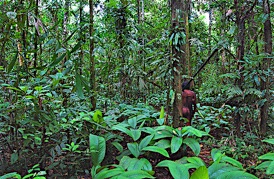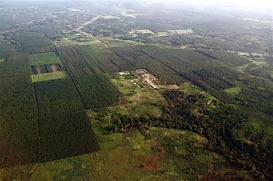Forever Forests

Huaorani hunter, Ecuador, 2007. Photo © Earthbilt
Earth needs forests… we need forests.
“… evolution did not intend trees to grow singly. Far more than ourselves they are social creatures, and no more natural as isolated specimens than man is as a marooned sailor or a hermit. Their society in turn creates or supports other societies of plants, insects, birds, mammals, micro-organisms; all of which we may choose to isolate and section off, but which remain no less the ideal entity, or whole experience, of the wood…
“Scientists restrict the word symbiotic to those relationships between species that bring some detectable mutual benefit; but the true wood, the true place of any kind, is the sum of all its phenomena. They are all in some sense symbiotic, being together in a togetherness of beings.”
From The Tree by John Fowles
Humans evolved in forests — they are in our DNA. Forests provide a large proportion of Earth’s oxygen and remove vast amounts of carbon dioxide. They are home to the vast majority of the variety of life forms on Earth, with at least 50% of Earth’s species found only in tropical forests.
We must learn again to really see forests, to again feel the awe, joy and succor they provide us. We must relearn that forests are not (at worst) simply “standing wood volume” or (at best) “in the way”. They are instead part of the living support system that bolsters humans and human civilization.
Trees are living organisms that provide habitat to millions of species and trillions of individual beings. When we destroy forests, we destroy ourselves and our future.
The UN definition of forests includes monoculture tree farms — and even the clearcut land — but they are not forests. This allows plantations to be considered regrown forests, which is added to “forest gain”, heavily skewing the numbers for net forest loss. The definition benefits industry and masks the true rates of global deforestation.
Monoculture plantations are not forests. Oil palm expansion in Cameroon, 2016. Photo © Earthbilt

Buttressed trees in old-growth forest, Costa Rica, 2010. Photo © Earthbilt


Slow Wood® is a project of Earthbilt and is a registered trademark. Website copyright © 2021